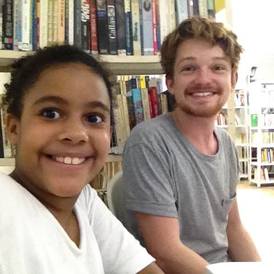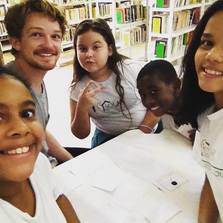Login
Signup
A Typical Teaching Day At Edumais
A typical teaching day at EduMais – By volunteer Dominic

 My name is Dominic – I am 26 years old and have been volunteering with EduMais since January till 22 June 2017. For the past four years, I have been living in Paris, working as an English teacher and studying a Master’s in Human Rights and Humanitarian Action at Sciences Po. After gaining some work experience in the NGO sector in Paris, I wanted to see how these organisations functioned on the ground and found that EduMais allowed me to do this as well as utilising my skills as an English teacher.
My name is Dominic – I am 26 years old and have been volunteering with EduMais since January till 22 June 2017. For the past four years, I have been living in Paris, working as an English teacher and studying a Master’s in Human Rights and Humanitarian Action at Sciences Po. After gaining some work experience in the NGO sector in Paris, I wanted to see how these organisations functioned on the ground and found that EduMais allowed me to do this as well as utilising my skills as an English teacher.
My typical day begins shortly before 8:30am when I leave my apartment in Cantagalo and make the short walk to our classroom in the library of Solar Meninos de Luz. Depending on my energy levels, I will either decide to walk from the bottom of rua Saint Roman for a gentle way up into the community, or if I’m feeling more brave I will wait until the stairs by the exit of General Osorio station. While it’s more exhausting, it is also very picturesque with stunning murals painted all the way up. At the top of the stairs, I cross the road and already people will be saying “bom dia” and asking how I am as I walk in.
My first job is to open up the classroom and prepare for my first class. Wednesdays from 9am-11am is my community class which I took over in March. There are usually around five children aged ten to twelve years old who go to other schools in the area but who only have lessons in the afternoon. They are always very eager to learn English and I am amazed at how well they remember vocabulary from previous lessons and their willingness to use it in conversation. In only three months they have made amazing progress both in English and socially – when the classes began they all seemed very shy and were scared to answer questions but now they have become much more confident in themselves and are always willing to try.
 Once a month, we have a staff meeting at 11am to discuss issues we are having and to learn new methods of dealing with them by utilising positive discipline. Previously, as an English teacher in Paris, I was teaching adults (where discipline was thankfully not an issue) and small groups of children. In four years of teaching in France, I never had any issues with the behaviour of students, but I knew this would not be the case when dealing with up to twenty children at a time, so the positive discipline approach has been invaluable to me in learning how to deal with children who may have behavioural or family issues, something I had never dealt with before. I have been amazed to see how well they respond to it – while it can be overwhelming to have a large group of children to deal with, the benefit of having at least three other teachers with you is that you can take any individual children who are having troubles away and help them individually while applying positive discipline.
Once a month, we have a staff meeting at 11am to discuss issues we are having and to learn new methods of dealing with them by utilising positive discipline. Previously, as an English teacher in Paris, I was teaching adults (where discipline was thankfully not an issue) and small groups of children. In four years of teaching in France, I never had any issues with the behaviour of students, but I knew this would not be the case when dealing with up to twenty children at a time, so the positive discipline approach has been invaluable to me in learning how to deal with children who may have behavioural or family issues, something I had never dealt with before. I have been amazed to see how well they respond to it – while it can be overwhelming to have a large group of children to deal with, the benefit of having at least three other teachers with you is that you can take any individual children who are having troubles away and help them individually while applying positive discipline.
After the meeting, I will usually have a short break to get some food and then back to the classroom to prepare for the afternoon lessons with the students of Solar Meninos de Luz. Between 12:30pm and 1pm, the teachers will be preparing and telling each other what the lessons they have planned entail (I will typically plan and lead two or three out of seven Solar lessons per week). Usually there are at least four teachers per afternoon session, although often there are more. Whereas I teach my community class alone, when dealing with fifteen to twenty young children, it is essential to have more people around to help students individually and in small groups. The children are very eager for help and the call of “tio” coming from six different directions can be very overwhelming alone.
At 1pm, we go to collect the first class. The afternoon begins with the 4th grade, who will line up and walk from the Ensino Fundamental building to the library where the EduMais classroom is. For the 4th grade, the class is split into two halves and each half is taught for thirty minutes each, usually split into smaller groups in the class so that one teacher is focusing on three or four children at a time. At this age they are learning basic phrases and vocabulary using games and fun worksheets.
Between 2pm and 4pm, we have the two Ensino Medio (High School) classes who in general have a very good level of English. Most of them have extra-curricular English classes at private language schools in the area through a scholarship from the school. I find teaching the Ensino Medio students the most interesting as while they have enough English to have a conversation, they also recognise their own shortcomings and want to work hard on learning English – they are always interested in speaking to you, inside and outside of the classroom. The Ensino Medio classes are smaller than the Ensino Fundamental classes so they have the whole hour as a whole class – this means you can go into much more depth and develop a greater understanding of what each student needs to improve on. This is very important for the older students as in the next year, a lot of them will be taking their leaving exams to determine whether they will be able to enter university and there is a sizeable portion of this exam which focuses on English.
At 4pm, we have a thirty-minute break when I will usually run down the road to the “lanches” bar and grab a salgado and coke to fuel myself for the final hour. The last class are the 5th grade who started their English lessons with EduMais last year and so have a basic knowledge of vocabulary already. Again, they are split into two groups having half an hour each and the lesson will follow a similar structure to that of the 4th grade. This year we are going over what was taught last year and it is great to see how much they remember. Some of the 5th grade were my very first students when I arrived in January, when I taught them at the Summer Camp which was organised during their school holidays.
After the second group leave, it is time to tidy the classroom ready for the next day of teaching. After putting all the chairs away, cleaning the board and putting away any unused worksheets, we lock up the room and leave. Walking out of the building, the street is full of parents and children who will stop you and say thank you and goodbye. One of the best things about teaching at EduMais for me is the feeling that you are part of the community – people will frequently say hello to me in the street and explain that I teach their son/daughter and ask me how they are at school. In a big city like Rio de Janeiro it is very easy to feel lost and overwhelmed but having that sense of community helps to make the experience much less daunting and more fulfilling.
My favourite thing about teaching with EduMais is the students – they have so much love, energy and personality that just being at the school itself is a treat. I have learnt so much from them, both seeing a completely different way of life and how they deal with it, but also their outlook on the world. A lot of them have grown up in very difficult situations but they still have a smile on their faces and have so much to give to anyone they meet. As soon as I started teaching at the school I felt accepted and now I feel like an integral part of their learning and their lives. Being here for a finite amount of time is hard because leaving them will be difficult but I look forward to keeping in contact with them and will be coming back to visit them in the coming years. I’m excited to see how they grow, emotionally and socially, and I know that I have made friends for life here in Rio de Janeiro.
Leave a Comment:
You must be logged in to post a comment.